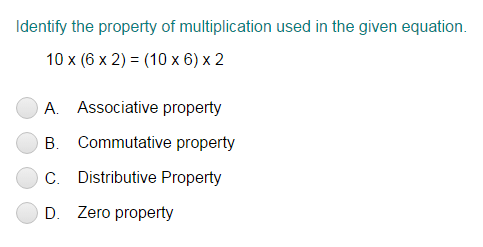- HOME
- QUIZZES
- MULTIPLICATION
- PROPERTIES OF MULTIPLICATION
Properties of Multiplication
Properties of multiplication:
Commutative property: When two numbers are multiplied together, the order of numbers does not affect the product or result. For example, 2 × 4 = 4 × 2.
Associative Property: When three or more numbers are multiplied, the grouping of numbers does not affect the product or result. For example, 10 × (6 × 2) = (10 × 6) × 2.
Distributive Property: Multiplying a sum by any number is the same as multiplying each addend by the number separately and then adding the products. For example, 9 × (5 + 7) = (9 × 5) + (9 × 7).
Identity Property: When a number is multiplied by 1, the result is the number itself. For example, 3 × 1 = 3.
Zero Property: When a number is multiplied by 0, the result is zero. For example, 2 × 0 = 0.
A B C D E F G H I J K L M N O P Q R S T U V W X Y Z
Help
The correct answer is
Remember :
The smallest number is the one that comes first while counting.
Solution :
To arrange the given numbers in order from smallest to greatest, find the smallest number among all the given numbers.
21,27,23
21 is the smallest number.



